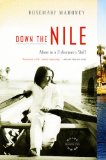Summary | Excerpt | Reviews | Beyond the Book | Readalikes | Genres & Themes | Author Bio

Critics' Opinion:
Readers' Opinion:
First Published:
Jul 2007, 288 pages
Paperback:
Sep 2008, 304 pages
 Book Reviewed by:
Book Reviewed by:
Diane La Rue
Buy This Book
The more I learned about the Nile, the less forbidding it
seemed. I had so often imagined rowing on the Nile that doing
so had begun to feel less like a fantasy and more like a memory
that only wanted its corresponding action rightfully exercised.
Two years after my first visit, I returned to Egypt, determined to
find a boat and make my trip on the Nile. In an effort to acquaint
myself with the stretch of the river that I was interested in rowing,
I once again spent four days on the deck of a cruise ship,
traveling - this time from Luxor to Aswan - with a pair of binoculars
pressed to my face, examining every island and shoal,
observing the currents, trying to gauge the swiftness of the river's
flow, watching fishermen at sunrise laying their nets. When rowing
upriver, the fishermen hugged the shore, where the current
was less intense and occasionally even eddied in reverse. Their
boats sat low in the water, were flat bottomed, were made of steel,
were on average twelve to fourteen feet long and three feet wide,
and were roughly the shape of a Turkish slipper, narrowed at
both ends but slightly higher and finer at the bow. As oars they
used long, coarse, bladeless planks that resembled nothing so
much as clapboards ripped from the face of a derelict house.
They used not the U-shaped metal oarlocks I was accustomed to,
but vertical pegs of wood or steel to which the immense oars
were lashed with a length of prickly twine. The current never appeared
swift enough to vex or deter these fishermen. They maneuvered
their boats with breathtaking precision and finesse,
making sudden one-hundred-eighty-degree turns with a simultaneous
and contrariwise two-wristed snap. From Aswan to
Cairo, the Nile bed falls little more than five inches per mile,
which means the river offers a relatively slow, peaceful ride. In
my observation, the current was swift but never roiling; there
were no rapids to speak of other than those tossed up by the boulders
of the first cataract above Aswan; and while there were shallows
treacherous enough to stop a misguided cruise ship, none
was shallow enough to prevent a small, light, flat-bottomed boat
from smoothly proceeding. As for the dangerous ships Egyptians
had warned of, there were no ships on the Nile that I could see,
other than the plodding, festively lit cruise boats equipped with
swimming pools and dance floors and packed with vacationing
Europeans. (The size of these cruise ships was trifling compared
to the hulking tankers I regularly marveled at on Narragansett
Bay.) There was never a threat of rain. There was the possibility
of a khamaseen, a hot southeasterly wind that whips dust out of
the Sahara and renders the air a stinging, opaque mass,* but this
was April and just in advance of the season for that. There was a
large lock at Esna that looked complex and possibly like trouble
for a small boat, and a few bridges that did not. As for
crocodiles, there were, the captain of my cruise ship had dismissively
confirmed with a dry laugh, no crocodiles whatsoever
in the Nile below the High Dam.
In planning my rowing trip, among my greatest worries was
unwanted attention from the Egyptian police. In terms of freedom
and accessibility, the Nile was a far cry from an American
river on which any psychopath could, without hindrance
or permission, indulge in any half-baked boating scheme he
was capable of devising. I had been told that in order to travel
alone on the Nile, I would need police permission, that such
permission was not likely to be granted, and that if by some
miracle permission was granted, weeks of bureaucratic wrangling
would follow; I would have to come up with a considerable
amount of money in fees; and that, in the end, if they let
me go, the police would insist on sending an officer with me
for my protection.
Copyright © 2007 by Rosemary Mahoney





The House on Biscayne Bay
by Chanel Cleeton
As death stalks a gothic mansion in Miami, the lives of two women intertwine as the past and present collide.

The Flower Sisters
by Michelle Collins Anderson
From the new Fannie Flagg of the Ozarks, a richly-woven story of family, forgiveness, and reinvention.

The Funeral Cryer by Wenyan Lu
Debut novelist Wenyan Lu brings us this witty yet profound story about one woman's midlife reawakening in contemporary rural China.
Your guide toexceptional books
BookBrowse seeks out and recommends the best in contemporary fiction and nonfiction—books that not only engage and entertain but also deepen our understanding of ourselves and the world around us.